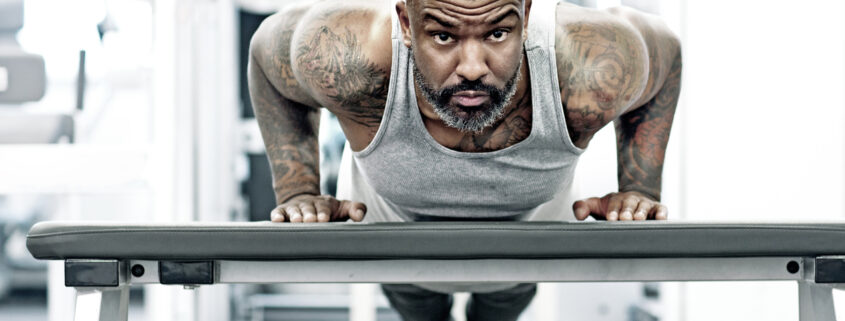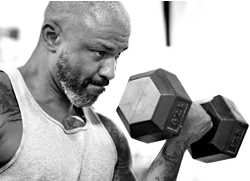Big Muscles Reduce Cancer Risk in Men
When men are young, they typically want big muscles primarily for superficial reasons. It’s to attract the girl, be admired among peers, or defend against bullying by other males.
Rarely do guys think ahead and determine that big muscles could save their lives.
But maybe those “superficial” reasons are more about survival and species perpetuation than they appear at first glance.
If so, then evidence is now revealing that ‘muscle for survivability’ transcends the years, possibly becoming more important with age.
Case in point: A study shows that big muscles reduce cancer risk and, more specifically, risk of death by cancer in men.
How much of a risk reduction?
The cohort study showed up to 40% less chance of developing a deadly cancer.
The research, conducted between 1980 and 2003, followed 8,677 men aged 20 to 82.
After testing the subject’s strength and medical parameters, the researchers monitored how many developed cancer and died as a result.
The findings showed that the stronger and more muscular a guy is, the less likely he is of dying of cancer. This is the case even if a man carries some body fat with his muscle mass.
Let’s take a look at possible reasons that big muscles reduce cancer risk in men.
Why Big Muscles Reduce Cancer Risk in Men
Scientists haven’t been able to pinpoint the reason that big muscles reduce cancer risk and mortality in men.
This leaves the mechanism by which muscle mass provides a protective effect to speculative theory.
One possible reason postulated is that strength workouts and muscle mass increase the body’s turnover of insulin-like growth factor-1 (IGF-1).
IGF-1 is produced in the liver in response to growth hormone released by the pituitary gland.
IGF-1 promotes cell growth throughout the body. This includes the growth of cancer cells when they’re present.
If there’s greater use and turnover of IGF-1 by the muscles, there’s less of it that can hang around and promote the growth of cancerous cells if they become present.
That’s one hypothesis, anyway.
Big Muscles Reduce Cancer Risk: The Inflammation Connection
Cellular inflammation is a major increaser of cancer risk.
Insulin resistance is a considerable cause of cellular inflammation.
Building big muscles through rigorous resistance training is a terrific way to eliminate insulin resistance. Inversely speaking, it’s a great way to increase insulin sensitivity.
This is likely another reason for big muscles reducing cancer risk in men.
Studies have shown that long-term weight training reduces systemic inflammation. This might be because lifting weights triggers muscles to release an anti-inflammatory myokine called interleukin-6 (IL-6).
In contrast, fat cells release a pro-inflammatory cytokine called tumor necrosis factor (TNF-α). This is at least one reason body fat contributes to long-term inflammation.
Long-term systemic inflammation can raise cancer risk by causing DNA damage.
So muscle building workouts combined with reasonably low body fat can lower inflammation and its associated cancer risks.
In addition, improved insulin sensitivity lowers a person’s average blood sugar levels.
Since chronically high blood sugar is also a direct cause of cellular inflammation, it becomes obvious how bigger muscles can reduce inflammation and risk of cancer by lowering average blood sugar levels.
Big Muscles Reduce Cancer Risk: Immune System Connection
Another connection between big muscles and reduced cancer risk is associated with immune system function.
Generally speaking, the older we get, the further our immune systems fall into decline. This can leave us susceptible to infection and disease of all types.
But in 1999, researchers discovered that the bigger and stronger a subject’s upper arm muscles are, the more cancer-eliminating immune system cells they have in their blood.
The study involved 62 participants ranging in age between 90 and 106. The researchers took blood samples from these subjects and then added cancer cells to the blood.
The scientists then observed and measured the time it took for immune cells to eliminate the cancer cells.
As it turned out, two variables affected the immune system cells and their ability to eliminate the cancer cells – muscle mass and vitamin D.
The bigger and stronger the upper arm muscles of the participants, the more cancer-eliminating ‘CD16’ immune cells they had.
The higher the vitamin D level of the participants, the more effectively the immune cells functioned.
Greater muscle mass equaled more immune cells in the blood.
Higher vitamin D equaled more effectiveness of those immune cells.
Interestingly, higher levels of vitamin D have also been associated with greater muscle mass.
Big Muscles Reduce Cancer Risk in Men: Conclusion
It’s amazing that just a few decades ago, building muscle was considered a sort of side-show reserved for a few of society’s overly physical misfits.
Mainstream acceptance ushered in a subsequent phase in which muscle building seemed only beneficial for the purpose of visual enhancement.
But more and more research findings have surfaced revealing muscle building is an incredibly healthy endeavor.
Evidence shows we actually need bigger and stronger muscles as a holistic approach to long-term health, vitality, and longevity.
Among the most important of these findings are those showing big muscles reduce cancer risk in men. Whether it’s due to higher IGF-1 turnover, reduced inflammation, or a stronger immune response, muscle and strength building workouts are a good defense against cancer.
References
- Jonatan R. Ruiz, Xuemei Sui, Felipe Lobelo, Duck-chul Lee, James R. Morrow Jr., Allen W. Jackson, James R. Hébert, Charles E. Matthews, Michael Sjöström and Steven N. Blair. ‘Muscular Strength and Adiposity as Predictors of Adulthood Cancer Mortality in Men.’ Cancer, Epidemiology, Biomarkers, and Prevention (Vol. 18, Issue 5) May 2009
- Pak-Shan Leung, William J. Aronson, Tung H. Ngo, Lawrence A. Golding, and R. James Barnard. ‘Exercise alters the IGF axis in vivo and increases p53 protein in prostate tumor cells in vitro.’ Journal of Applied Physiology (Vol. 96, Issue 2, Pgs. 450-454) Feb 2004
- Mariani E, Ravaglia G, Forti P, Meneghetti A, Tarozzi A, Maioli F, Boschi F, Pratelli L, Pizzoferrato A, Piras F, Facchini A. ‘Vitamin D, thyroid hormones and muscle mass influence natural killer (NK) innate immunity in healthy nonagenarians and centenarians.’ Clinical and Experimental Immunology (Vol. 116, Issue 1, Pages 19-27) April 1999







Leave a Reply
Want to join the discussion?Feel free to contribute!